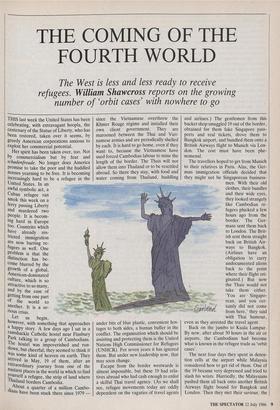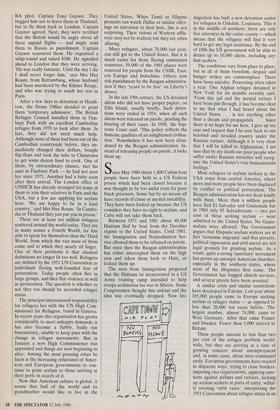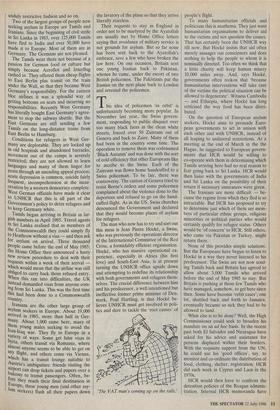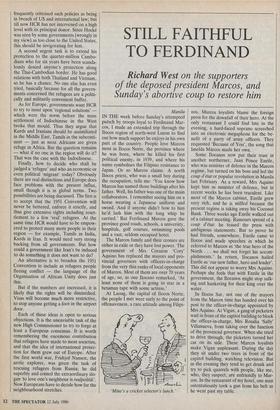THE COMING OF THE FOURTH WORLD
The West is less and less ready to receive number of 'orbit cases' with nowhere to go
THIS last week the United States has been celebrating, with extravagant hoopla, the centenary of the Statue of Liberty, who has been restored, taken over it seems, by greedy American corporations anxious to exploit her commercial potential.
Let us begin, however, with something that approaches a happy story. A few days ago I sat in a ramshackle Catholic hostel near Finsbury Park talking to a group of Cambodians. The hostel was impoverished and run- down, but cheerful; they seemed to think it was some kind of heaven on earth. They arrived in May, 19 of them, after an extraordinary journey from one of the nastiest places in the world in which to find Yourself a refugee, the strip of land where Thailand borders Cambodia: About a quarter of a million Cambo- dians have been stuck there since 1979 — since the Vietnamese overthrew the Khmer Rouge regime and installed their own client government. They are marooned between the Thai and Viet- namese armies and are periodically shelled by each. It is hard to go home, even if they want to, because the Vietnamese have used forced Cambodian labour to mine the length of the border. The Thais will not allow them into Thailand or to be resettled abroad. So there they stay, with food and water coming from Thailand, huddling under bits of blue plastic, convenient hos- tages to both sides, a human buffer in the conflict. The organisation which should be assisting and protecting them is the United Nations High Commissioner for Refugees (UNHCR). For seven years it has ignored them. But under new leadership now, that may soon change. Escape from the border westwards is almost impossible, but these 19 had rela- tives abroad who had cash enough to enlist a skilful Thai travel agency. (As we shall see, refugee movements today are oddly dependent on the vagaries of travel agents and airlines.) The gentlemen from this bucket shop smuggled 19 out of the border, obtained for them fake Singapore pass- ports and real tickets, drove them to Bangkok airport, and bundled them onto a British Airways flight to Munich via Lon- don. The cost must have been phe- nomenal.
Back on the jumbo to Kuala Lumpur. By now, after about 50 hours in the air or airports, the Cambodians had become what is known in the refugee trade as 'orbit cases'.
The next four days they spent in deten- tion cells at the airport while Malaysia considered how to get rid of them. One of the 19 became very depressed and tried to slash his wrists. Hurriedly, the Malaysians pushed them all back onto another British Airways flight bound for Bangkok and London. Then they met their saviour, the BA pilot, Captain Tony Gaynor. They begged him not to leave them in Thailand, but to fly them back to London. Captain Gaynor agreed. Next, they were terrified that the British would be angry about all these unpaid flights — and might send them to Russia as punishment. Captain Gaynor reassured them. He organised a whip-round and raised $100. He signalled ahead to London that they were arriving. `He was really fantastic. Until the day I die I shall never forget him,' says Mrs Huy Roum, from Battambang, whose husband had been murdered by the Khmer Rouge, and who was trying to reach her son in Paris.
After a few days in detention at Heath- row, the Home Office decided to grant them 'temporary admission'. The British Refugee Council installed them in Fins- bury Park with an excellent Cambodian refugee from 1979 to look after them. In fact, they did not need much help. Although none of them had been out of the Cambodian countryside before, they im- mediately changed their dollars, bought flip-flops and took the tube to Chinatown to get some decent food to cook. One of them, by extraordinary chance, met his aunt in Finsbury Park — he had not seen her since 1975. Another had a baby soon after their arrival. The London office of UNHCR has already arranged for some of them to join their relatives in Paris and the USA, but a few are applying for asylum here. 'We are happy to be in a kind country,' said Mrs Huy Roum. 'In Cambo- dia or Thailand they just put you in prison.'
There are at least ten million refugees scattered around the world today. They are in many senses a Fourth World, far less able to speak for themselves than the Third World, from which the vast mass of them come and in which they nearly all linger. One of their problems is that classical definitions no longer fit too well. Refugees are defined by the 1951 UN Convention as individuals fleeing well-founded fear of persecution. Today people often flee in large groups, and they flee violence as well as persecution. The question is whether or not they too should be accorded refugee status.
The principal international responsibility for refugees lies with the UN High Com- missioner for Refugees, based in Geneva. In recent years this organisation has grown considerably to meet unhappy demands; it has also become a flabby, badly run bureaucracy, unable to keep pace with the change in refugee movements. But in January a new High Commissioner was appointed and things are now beginning to alter. Among the most pressing crises he faces is the increasing reluctance of Amer- ican and European governments to con- tinue to grant asylum to those arriving at their ports in search of it.
Now that American culture is global, it seems that half of the world and its grandmother would like to live in the United States. When Tamil or Filipino peasants can watch Dallas or similar offer- ings on television in their huts, this is not surprising. Their visions of Western afflu- ence may not be realistic but they are often alluring.
Many refugees, about 70,000 last year, can still get to the United States. But it is much easier for those fleeing communist countries; 59,000 of the 1985 places were reserved for people from the USSR, East- ern Europe and Indochina. Others now risk punishment by the Reagan administra- tion if they 'yearn to be free' on Liberty's shores.
In the late 19th century, the US detained aliens who did not have proper papers, on Ellis Island, usually briefly. Such deten- tions were ended in 1954, when all such aliens were released on parole, pending the hearing of their cases. In 1958, the Sup- reme Court said: 'This policy reflects the humane qualities of an enlightened civilisa- tion.' Nonetheless it has now been aban- doned by the Reagan administration. In- stead of releasing people on parole, it locks them up.
Since May 1980 about 1,800 Cuban boat people have been held in a US Federal prison which had been closed because it was thought to be too awful even for poor black prisoners. Some but by no means all have records of crime or mental instability. They have been locked up because the US considers they have no right to asylum, and Cuba will not take them back.
Between 1971 and 1981 about 40,000 Haitians fled by boat from the Duvalier regime to the United States. Until 1981, the Immigration and Naturalisation Ser- vice allowed them to be released on parole. But since then the Reagan administration has either intercepted them on the high seas and taken them back to Haiti, or locked them up.
The men from Immigration proposed that the Haitians be incarcerated in a US Army training camp intended to help troops acclimatise for war in Siberia. Some Congressmen thought this unkind and the idea was eventually dropped. Now Im- migration has built a new detention centre for refugees in Oakdale, Louisiana. This is in the middle of nowhere; there are only five attorneys in the entire county — which means that the refugees will find it very hard to get any legal assistance. By the end of 1986 the US government will be able to detain up to 10,000 aliens, including asy- lum seekers.
The conditions vary from place to place, but in all of them boredom, despair and hunger strikes are commonplace. There have been suicides. Processing often takes a year. One Afghan refugee detained in New York for six months recently said, `From this jail and the mental torture I have been put through, it has become clear to me that what I had heard about the United States . . . is not anything other than a dream and propaganda. . . . Since there is no hope for me here, I give up my case and request that I be sent back to our belched and invaded country under the Russian torture. Although it is very clear that I will be killed in Afghanistan, I am sure that by my death our poor people who suffer under Russian atrocities will recog- nise the United States's true humanitarian feelings.'
Most refugees or asylum seekers in the USA come from central America, where more and more people have been displaced by conflict or political persecution. The Reagan administration has not dealt kindly with them. More than a million people have fled El Salvador and Guatemala but in 1984 only 93 Salvadoreans — two per cent of those seeking asylum — were admitted to the United States. No Guate- malans were allowed. The Government argues that Hispanic asylum seekers are in fact 'economic migrants' and that poverty, political oppression and civil unrest are not legal grounds for granting asylum. As a result, quite a strong 'sanctuary' movement has grown up amongst American churches, especially in the southern states, where most of the Hispanics first come. The Government has bugged church services, and several priests have been arrested.
A similar crisis and similar restrictions have developed in Europe. Last year about 165,000 people came to Europe seeking asylum or refugee status — as opposed to less than 20,000 ten years before. The largest number, almost 74,000, came to West Germany. After that came France and Sweden. Fewer than 5,000 arrived in Britain.
These people amount to less than two per cent of the refugee problem world- wide, but they are arriving at a time of growing concern about unemployment and, in some cases, about inter-communal strife. European governments have reacted in disparate ways, trying to close borders, imposing visa requirements, applying sanc- tions against airlines and carriers, locking up asylum seekers at ports of entry, wilful- ly creating 'orbit cases', interpreting the 1951 Convention about refugee status in an unduly restrictive fashion and so on.
Two of the largest groups of people now seeking asylum in Europe are Tamils and Iranians. Since the beginning of civil strife in Sri Lanka in 1983, over 125,000 Tamils have fled to India and over 50,000 have made it to Europe. Most of them are in Germany. The Germans are not pleased.
The Tamils went there not because of a passion for German food or culture but simply because Aeroflot and Interfiug cashed in. They offered them cheap flights to East Berlin plus transit on the train under the Wail, so that they became West Germany's responsibility. For the eastern bloc airlines it was a splendid way of getting bottoms on seats and incurring no responsibilities. Recently West Germany has literally bought East Germany's agree- ment to stop the subway shuttle. But the East Germans are still sending a few Tamils on the long-distance trains from East Berlin to Hamburg. Conditions for refugees in West Ger- many are deplorable. They are locked up in old hospitals and abandoned barracks; movement out of the camps is severely restricted; they are not allowed to learn languages and many of them linger for years through an unending appeal process; acute depression is common, suicide fairly frequent, incomprehension at the incar- ceration by a western democracy complete. West German officials have made it clear to UNHCR that this is all part of the Government's policy to deter refugees and to keep Germany white. Tamils began arriving in Britain in lar- gish numbers in April 1985. Travel agents in Sri Lanka realised that as members of the Commonwealth they could simply fly to Heathrow without a visa — and then ask for asylum on arrival. Three thousand people came before the end of May 1985; the Home Office then announced a hasty new review procedure to deal with their requests within a week of their arrival Which would mean that the airline was still obliged to carry back those refused entry. When this ran into difficulties, the UK instead demanded visas from anyone corn- ing from Sri Lanka. This was the first time this had been done to a Commonwealth country. Iranians are the other large group of asylum seekers in Europe. About 19,000 arrived in 1985, more than half in Ger- many. About 1,000 came here, many of them young males seeking to avoid the Iran-Iraq war. They fly to Europe in a variety of ways. Some get false visas in SYria, others transit via Romania, where almost anyone seems to be able to get on any flight, and others come via Vienna, which has a transit lounge suitable to Austria's ambiguities: friends visiting the airport can drop tickets and papers over a fbalcony to transit passengers. Often, be- ore they reach their final destination in Europe, these young men (and other asy- lum seekers) flush all their papers down the lavatory of the plane so that they arrive literally stateless.
Their requests to stay in England in order not to be martyred by the Ayatollah are usually met by Home Office letters saying that avoidance of military service is not grounds for asylum. But so far none has been sent back to the Ayatollah's embrace, save a few who have broken the law here. On one occasion, Britain sent one young Iranian back to Pakistan, whence he came, under the escort of two British policemen. The Pakistanis put the Iranian on the next plane back to London and arrested the policemen.
This idea of policemen 'in orbit' is unfortunately becoming more popular. In November last year, the Swiss govern- ment, responding to public disquiet over too many black faces in the clean white streets, forced over 50 Zaireans out of Geneva and back to Zaire. Many of them had been in the country some time. The operation to remove them was codenamed `Black Autumn' and was done with the sort of cold efficiency that other Europeans like to ascribe to the Swiss. Each of the Zaireans was flown home handcuffed to a Swiss policeman. To be fair, there was controversy. The canton of Geneva tried to resist Berne's orders and some policemen complained about the violence done to the deportees and refused to go on the hand- cuffed flight. As in the US, Swiss churches denounced the Government and declared that they would become places of asylum for refugees.
The man who now has to try and sort out this mess is Jean Pierre Hocke, a Swiss, who was previously the operations director of the International Committee of the Red Cross, a formidably efficient organisation. Hocke, who has massive operational ex- perience, especially in Africa (his first love) and South-East Asia, is at present turning the UNHCR office upside down and attempting to redefine its relationship with both governments and refugees them- selves. The crucial difference between him and his predecessor, a well intentioned but ineffective former prime minister of Den- mark, Poul Hartling, is that Hocke be- lieves UNHCR must get involved in poli- tics and dare to tackle the 'root causes' of The VAT man's coming up on the rails.' people's flight.
To many humanitarian officials and politicians this is anathema. They just want humanitarian organisations to deliver aid to the victims and not question the causes. That has certainly been the UNHCR way till now. But Hocke insists that aid often merely assuages our consciences and does nothing to help the people to whom it is nominally directed. Too often we think that a little charity will keep human misery 10,000 miles away. And, says Hocke, governments often reckon that 'because humanitarian interventions will take care of the victims the political situation can be allowed to degenerate'. Witness Cambodia — and Ethiopia, where Hocke has long criticised the way food has been distri- buted.
On the question of European asylum seekers, Hocke aims to persuade Euro- pean governments to act in unison with each other and with UNHCR, instead of all leaping to unilateral restrictions. At a meeting at the end of March in the the Hague, he suggested to European govern- ments that HCR would be willing to co-operate with them in determining which Tamils arriving here had no real reason to fear going back to Sri Lanka. HCR would then liaise with the governments of India and Sri Lanka on the possibility of their return if necessary assurances were given.
The Iranians are more difficult — be- cause the regime from which they fled is so intractable. But HCR has proposed to try to determine just which of them are mem- bers of particular ethnic groups, religious minorities or political parties who would certainly qualify for refugee status. Others would be 'of concern' to HCR. Still others, who came via Pakistan or Turkey, might return there.
None of this provides simple solutions. But the Europeans have begun to listen to Hocke in a way they never listened to his predecessor. The Swiss are not now send- ing Tamils back and Britain has agreed to allow about 3,000 Tamils who arrived before the end of May 1985 to stay. But Britain is pushing at those few Tamils who have managed, somehow, to get here since then. Some have become 'orbit cases'; one lot, shuttled back and forth to Jamaica, eventually became so sick they had to be allowed to land.
What else is to be done? Well, the High Commissioner could seek to broaden his mandate on an ad hoc basis. In the recent past both El Salvador and Nicaragua have asked for his advice and assistance for persons displaced within their borders. With the requisite support from the UN, he could use his 'good offices', say, to monitor and co-ordinate the distribution of food, clothing, shelter, registration. HCR did such work in Cyprus and Laos in the 1970s.
HCR would then have to confront the detention policies of the Reagan adminis- tration. Internal HCR memoranda have frequently criticised such policies as being in breach of US and international law; but till now HCR has not intervened on a high level with its principal donor. Since Hocks was seen by some governments (wrongly in my view) as too close to the United States, this should be invigorating for him.
A second urgent task is to extend his protection to the quarter-million Cambo- dians who for six years have been scanda- lously denied anyone's protection along the Thai-Cambodian border. He has good relations with both Thailand and Vietnam, so he has a chance. No one else has even tried, basically because for all the govern- ments concerned the refugees are a politi- cally and militarily convenient buffer.
As for Europe, governments want HCR to try to insist upon 'regional solutions' which were the norm before the mass settlement of Indochinese in the West broke that mould. Thus they argue that Kurds and Iranians should be assimiliated in the Middle East, Tamils in the subconti- nent — just as most Africans are given refuge in Africa. But the question remains — what if no one in the region will do it? That was the case with the Indochinese.
Finally, how to decide who shall be judged a 'refugee' and who an economic or even political 'migrant' today? Obviously there are real distinctions and Europe does face problems with the present influx, small though it is in global terms. Two possibilities are being discussed. The first is to accept that the 1951 Convention will never be bettered, enforce it strictly, and thus give extensive rights including reset- tlement to a few 'real' refugees. At the same time HCR would have to be empow- ered to protect many more people in their region — for example, Tamils in India, Kurds in Iran. It would need very strong backing from all governments. But how could a government like Iran's be induced to do something it does not want to do?
An alternative is to broaden the 1951 Convention to include as refugees people fleeing conflict — the language of the Organisation of African Unity does just this.
But if the numbers are increased, it is likely that the rights will be diminished. Visas will become much more restrictive, to stop anyone getting a foot in the airport door.
Each of these ideas is open to serious objections. It is the unenviable task of the new High Commissioner to try to forge at least a European consensus. It is worth remembering the enormous contribution that refugees have made to most societies, and that the idea of international protec- tion for them grew out of Europe. After the first world war, Fridtjof Nansen, the arctic explorer, was given the task of rescuing refugees from Russia; he did superbly and coined the extraordinary slo- gan `to love one's neighbour is realpolitik'. Now Europeans have to decide how far the neighbourhood stretches.





















































 Previous page
Previous page